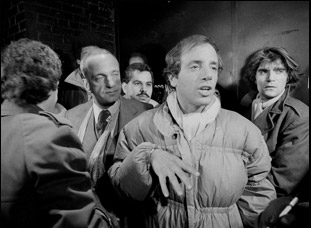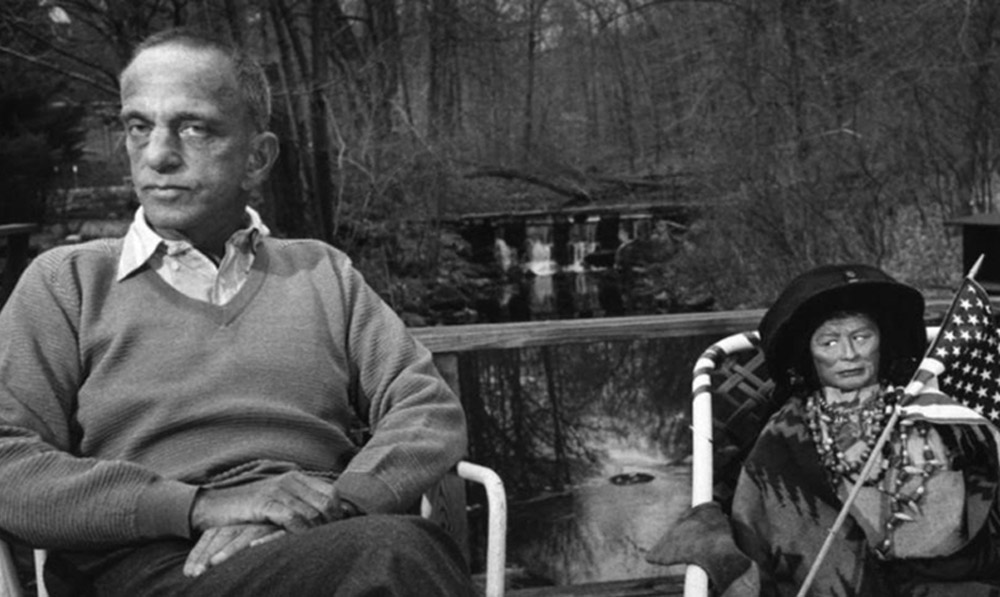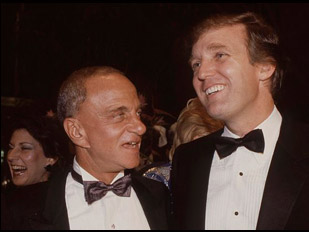“Everything I say has to be true, I cannot say anything I can’t repeat under oath,” Roy Cohn can be heard saying in “Bully. Coward. Victim: The Story of Roy Cohn,” which as you come to learn about the notorious lawyer is convenient when he rarely ever showed up in court. The aide to Joseph McCarthy and future fixer for Donald Trump was known to settle at least 65 to 70% of his cases before they ever made it to the docket, often putting pressure on adversaries privately through his ties to the mob or publicly through his ability to give a juicy story to the press in exchange for doing his bidding.
For as much news as Cohn made, he wasn’t one to leave a paper trail with his legal training and desire to keep his sexuality a secret leading to a double life — as director Ivy Meeropol finds, he couldn’t be bothered with paying bills either, only dealing with cash transactions when he was absolutely forced to. While it’s extraordinary enough that Meeropol, the granddaughter of Julius and Ethel Rosenberg, whose death sentence during the Communist witch hunt of the 1960s Cohn was directly responsible for, is the one to uncover Cohn’s hidden history (complementing Matt Tyrnauer’s biography from last year, “Where’s My Roy Cohn?”), it’s revelatory what she finds retracing the lawyer’s rise to power, prioritizing who he knew over what he knew. A tireless advocate who stood for nothing but how he could enrich himself, Meeropol finds him brokering deals with the conservative owners of Estee Lauder to make his boyfriend Peter Fraser the face of the brand as Mr. Lauder and getting Rep. John LeBoutillier, a freshman congressman from New York, to write a letter of recommendation for Donald’s sister Mary Ann Trump to sit on the federal bench.
While “Bully. Coward. Victim” gets accounts of Cohn’s chicanery from those who dealt with him first-hand, Meeropol accesses the man himself through audio recordings and the research of investigative reporter Peter Manzo, who once profiled him for Playboy. Being vain enough to use the rope he’s given to hang himself in interviews, the director brings all the threads together to form a most compelling yarn, showing how he found ways to place himself above the law by knowing those who carried them out and reaped the benefits with a summer home in Provincetown where he’d keep around a small crystal bowl of cocaine to keep the good times rolling. Still, “Bully. Coward. Victim” is quite sobering and becomes a fitting companion to Meeropol’s first film “Heir to an Execution,” in which she investigated the root causes of her grandparents’ execution, when Cohn’s fingerprints are all over the state of the nation today and on the eve of the film’s premiere on HBO as well as a final bow on the festival circuit at AFI Docs this weekend, the director spoke about the responsibility of sharing this story now, uncovering such rich materials to tell it and having to get inside Cohn’s point of view.
Obviously, I knew who Roy Cohn was since I was a kid, or I knew the name but I didn’t know much about him. And as we talk about in the film, when I discovered he was gay and died of AIDS after visiting the AIDS quilt in Washington DC, I became more fascinated and intrigued by him. I made “Heir to an Execution” and I did not think I was going to be revisiting my family story in my work, although maybe that was naive of me because it’s something I live with all the time and I think about, but when he became so relevant when Donald Trump was elected, I decided it was important enough for me to try to understand him more and what it means that his mentee is now in the White House. I was motivated by how upset and scared I was by the idea that someone so connected to Roy Cohn had become president, but it wasn’t enough to just use my family’s story as a narrative device. It was really important for me to really find something to contribute to his story beyond his role in my grandparents’ case.
I went back to watch “Heir to an Execution” and I saw how much trepidation there was to even broach the subject of your grandparents’ case with your father and how Roy Cohn acts as a largely unseen hand there. Could you hit the ground running based on what you learned from that film?
In “Heir to an Execution,” you see me really focusing on David Greenglass as the major villain in the story, and I embraced that. I believed that he was the horrible character – how could my grandmother’s brother do this and lie, so I was so focused on him that I really don’t think I understood or paid as much attention to the role of Roy Cohn. I was so focused on this familial tragedy that what I realized after making “Heir to an Execution” and learning more and just maturing more in my thinking is that Roy Cohn is a much greater villain and David Greenglass is really, in some ways, a victim as well because of what he was confronted with. I realized that wow, Cohn helped create the testimony for Greenglass and my grandmother did the typing and that was the only evidence they had against her and it turned out to be a lie that Cohn created for Greenglass, or helped create with others.
I’m always trying to put myself, as best I can, in the shoes of someone that I’m trying to understand and explore, and my understanding now has evolved and it is on a continuum, so I feel like [these are] complementary films and then the other part of it is I really didn’t know how much Cohn had been harassing and following and confronting my father during my childhood when my father’s trying to reopen the case. Cohn would appear with him [on TV] or attack him in the press and be so dismissive of the Rosenberg boys trying to clear their parents’ name.
It is so easy to write off Roy Cohn as pure evil, which there’s no doubt he is, but was it a challenge to get people to interrogate their emotions rather than leave it at that?
It’s definitely challenging and I wasn’t even able to geta lot of the people I tried to get access to who were close to Cohn for years, including his former secretary of 30 years who’s still around. She wouldn’t talk to me – I got close to that, and also Peter Fraser, his last boyfriend who was with him at the end of his life. But I was pleasantly surprised by how the people we did find didn’t hold back. When someone like Cindy Adams or John LeBoutillier just matter-of-factly told me how Cohn behaved, they didn’t try to sugarcoat it. They didn’t try to explain it away. They just said this is how he operated, this is how he would wield power, and that’s how he would manipulate the press. We took great pains to find subjects who had direct experiences with him, so those anecdotes that we get are so vivid, like Cindy Adams talking about him not paying for the artwork. But the other thing is we have the audio tapes in his own voice, talking about his own life and I was really happy to be able to use those tapes so that it wasn’t just people talking about him.

That was an incredible gift and serendipity. What happened was I actually started researching the film in Provincetown because I learned from reading “Citizen Cohn,” Nicholas von Hoffman’s biography, that he had been going to Provincetown for many years and I spent a lot of time there, and I have a lot of friends there. I had heard of Peter Manzo because he’s a fairly well-known journalist there, but I never put it together and I was asking a friend of mine who’s gay and spends a lot of time in Provincetown, “Do you know anyone who’s been around and might’ve crossed paths with Roy Cohn, particularly in the early to mid-‘80s?” He connected me with a guy named Eugene Fedorko, who trades his time between Provincetown and New York, and was staying with Peter Manzo. Now, Eugene didn’t know anybody [connected to Cohn], but we had a lovely chat and he goes to Peter Manzo’s house and says, “Guess who I just had coffee with? The granddaughter of Ethel and Julius Rosenberg who’s trying to make a film about Roy Cohn.” Apparently Peter Manzo spit his coffee out and said, “Get her over here right now.” [laughs]
It turned out he lived around the corner from where my parents have a home and I went over for what I thought at first was going to be a quick visit to meet this guy and we ended up spending four hours together. He tells me that he did an interview with Cohn for Playboy magazine and he had all these tapes that no one had ever heard. For a documentary filmmaker, it’s like I hit the jackpot and I was so excited. I had to convince Peter to work with me and that I wanted exclusive access to those tapes, but when he’s going through his boxes, that’s all happening in real time, so when he pulls out all those bills [of Cohn’s] and the proof of money laundering through his lover Peter Fraser, Peter [Manzo] hadn’t looked at that material until it was on camera. So meeting Peter Manzo and getting access to his materials is what launched this project even more than my own family connections because then I felt like I had something really special. That’s what I took to HBO was the combination of my personal approach and the materials I was getting from Peter.
It’s a genuinely fun film even when it’s documenting these horrors that Cohn was capable of. Was it a challenge structurally to have these flights of fancy for Cohn, like his time in Provincetown, and showing how he led these parallel lives?
I said from the get-go, I wanted the audience to feel like we were in Roy Cohn’s POV, so when we’re in Provincetown, I wanted it to feel more fun and relaxed because that’s how it felt for him to be there, or for the Studio 54 section, we talked extensively with our fabulous composer Nathan Halpern how about the music should help bring that feeling to life. Even when he’s dashing around on his European tour of American libraries with [his lover] G. David Schine, he’s having fun, so we’re not going to make that sinister because I wanted this experience to feel like you’re in and out of his life. But this edit was very challenging because we got to a certain point where we realized those were the tentpoles – the parallel lives of my dad and Cohn. Not like we plotted it out that way, but it helped inform us as we were editing and it raised these questions of well, wait, who’s the traitor and who’s the patriot?
The film premiered last fall at the New York Film Festival before all this craziness ensued. What has it been like to bring this out into the world?
That was an incredible thrill for me to be at that festival because we got a lot of good feedback and many of our subjects were there and then we were on the road at numerous film festivals until of course everything got shut down. Unfortunately, we weren’t able to continue doing that, but HBO produced this film, so I knew it had a home and I’ve been saying you can never perfectly plan the timeliness of a film you make, but I probably couldn’t have planned this one better because I feel like we’re in a moment where there’s so many things that are relevant today about Roy Cohn’s story that should’ve been a cautionary tale for us years ago and now maybe we’re ready to hear it.
“Bully. Coward. Victim. The Story of Roy Cohn” will air on HBO on June 18th. It will also screen virtually at AFI Docs.





